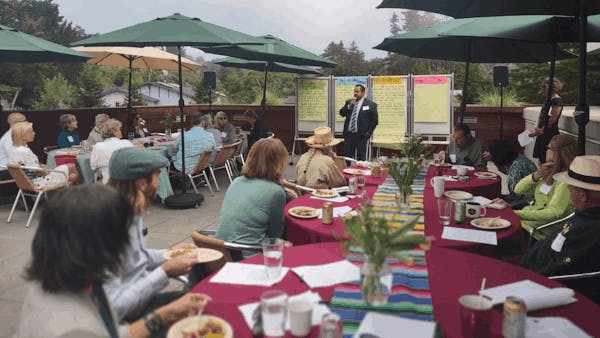Act Now
This giving season presents a unique opportunity to strengthen the place we call home. And this year, there's added reason to act.

Donors & Local Leaders in Conversation
On the Table: Homelessness Prevention and Response
Talking Together About Reducing Homelessness
How do we break a problem like homelessness down so we can tackle it step by step? How do we help youth? Veterans? Families on the edge of losing their apartments? What can individual donors do to help?
Gathering Around the Table
As a community, we’re at a critical time where we need innovative, community-driven, local solutions to reducing homelessness. At the center of lasting solutions are strong relationships. Our On the Table event is a series of participatory mealtime conversations that connects our community of donors to current issues and each other.
For the conversation on Homelessness Prevention & Response we invited:
On Preventing Homelessness:
Ray Cancino, Chief Executive Officer of Community Bridges
Paz Padilla, Programs and Impact Director of Community Action Board of Santa Cruz County
Lejla Bratovic, Executive Director of Conflict Resolution Center of Santa Cruz County
On Homelessness Response:
Mike Johnson, Executive Director of Pajaro Valley Shelter Services
Phil Kramer, Chief Executive Officer of Housing Matters
Personal Connections
Ray, Lejla, Paz, Mike, and Phil shared their perspectives on policy, ways to understand the intersectionality of poverty and mental health, new approaches to conflict resolution, and how, despite the scope of the issue, everyone has a part to play in ending homelessness. The conversation was candid and deeply personal at times as folks shared stories of losing loved ones to addiction, their own experiences of homelessness, and the frustration of trying to help but not feeling like they are getting anywhere.
There are Actions We Can Take
All of the leaders shared the conviction that no one-sized solution fits all but ending homelessness is possible and will take increased investments in affordable housing and supportive services to help individuals avoid preventable eviction, and address other challenges they face.
The group discussed collective actions we can take:
1. Sign up for action alert opportunities and support housing projects by writing advocacy letters to your elected officials and to the press (op-eds or guest commentary).
2. Volunteer with homeless services agencies or help answer calls for eviction prevention.
- Conflict Resolution Center
- Community Action Board Santa Cruz County
- Community Bridges
- Housing Matters
- Pajaro Valley Shelter Services
3. Take a mediation training to become a volunteer housing mediator or help educate tenants and landlords by inviting one of the partners to speak at one of your groups (Ex: Rotary)
- Conflict Resolution Center, sign up here or contact Lejla Bratovic, CRC Executive Director
4. Join Housing Santa Cruz County to help advocate: sign up for their newsletter, learn more, and attend their events. Donate to support their coalition and advocacy work.
5. Donate and resource agencies helping people at risk of or experiencing homelessness.


